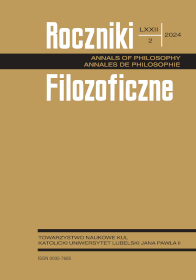Nowy relatywizm aletyczny
New Alethic Relativism
Author(s): Marcin Iwanicki, Tadeusz Szubka Subject(s): Philosophy, Epistemology
Published by: Towarzystwo Naukowe KUL & Katolicki Uniwersytet Lubelski Jana Pawła II
Keywords: context of assessment; Crispin Wright; faultless disagreement; John MacFarlane, proto-relativism; retraction; truth-relativism; underdetermination
Summary/Abstract: Relativism in contemporary analytic philosophy, vigorously advanced and elaborated in the first two decades of the XXI century, is a carefully formulated doctrine with a battery of semantic distinctions. Its defenders attempt to show that a suitably constrained and moderate form of relativism can be used to describe and explain puzzling features of our discourse in certain domains concerning personal taste, epistemic possibilities, or contingent future. In the essay, we outline the key ideas of one such defence, undertaken by the American philosopher John MacFarlane, and explain its merits in comparison with contextualism. In the final section, elaborating on some criticisms formulated by Crispin Wright, we point out to the general difficulties of this form of relativism. In particular, we emphasize the problematic nature of the transition from descriptive semantic theses to normative metaphysical conceptions of realism and objectivity, which is partly a consequence of the idea familiar from philosophy of science that evidence does not uniquely determine the choice of a theory, and thus we are never faced with one uniquely best explanation, but always with at least several equally good ones. This is well illustrated in the case of statements about contingent future, which need not be construed as sensitive to the context of assessment, but can just as well be taken as a manifestation of a dynamic metaphysics of becoming.
Journal: Roczniki Filozoficzne
- Issue Year: 72/2024
- Issue No: 2
- Page Range: 377-400
- Page Count: 24
- Language: Polish

